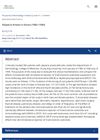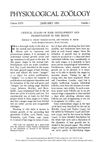Alopecia Areata: Gene Expression in Skin Samples from Patients
March 2001
in “
Clinics in dermatology
”

TLDR Alopecia areata involves immune response and gene changes affecting hair loss.
Alopecia areata (AA) is a non-scarring inflammatory hair loss disease with a complex autoimmune basis. This study examined gene expression in skin samples from 10 AA patients, comparing lesional and non-lesional sites. Researchers identified 363 differentially expressed genes (DEGs), with 97 up-regulated and 266 down-regulated. The findings suggested a T-cell mediated immune response and a possible humoral mechanism in AA. Additionally, there was evidence of cellular proliferation arrest, apoptotic dysregulation, and decreased expression of hair follicle structural proteins. Further analysis distinguished gene profiles between patients with AA of less than 1 year duration (n = 4) and more than 1 year duration (n = 6), indicating unique gene expression patterns in different stages of the disease.




